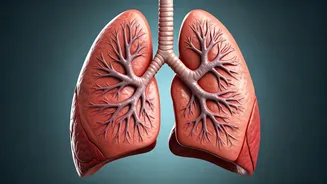Processed Meats and Lungs
Processed meats, such as bacon, sausages, and deli meats, often contain high levels of nitrites. These are added as preservatives and to enhance color,
but when consumed, nitrites can trigger inflammation in the airways, making breathing more difficult. Studies show that a diet rich in processed meats is linked to a higher risk of developing chronic obstructive pulmonary disease (COPD), a progressive lung disease that makes it hard to breathe. The inflammation caused by nitrites damages the delicate tissues of the lungs, impacting their function over time. Cutting back on these foods and choosing leaner protein sources, such as grilled chicken or fish, can help improve lung health. The reduction of nitrites and added preservatives can also provide protection to the lungs and improve overall health.
Dairy's Impact on Breathing
Dairy products, while a good source of calcium and protein, can trigger increased mucus production in some individuals. This excess mucus can clog the airways, especially for those with existing respiratory conditions like asthma or allergies, and makes breathing more labored. Milk, cheese, yogurt, and ice cream can lead to congestion, which further restricts airflow. Some people are sensitive to lactose or the proteins in dairy, which can inflame the airways. Those who experience respiratory symptoms after eating dairy might consider alternatives, such as plant-based milk (almond, soy, or oat milk), to alleviate congestion and promote easier breathing. It's essential to understand individual responses to food to make informed dietary choices that support respiratory health.
Salty Foods and Airways
Excessive salt intake can lead to fluid retention, which puts extra stress on the lungs, making breathing more difficult. High-sodium foods, such as processed snacks, fast foods, and heavily salted meals, can exacerbate this. Fluid buildup can congest the lungs, increasing the effort required for each breath. In individuals with asthma or other respiratory conditions, this can worsen symptoms like coughing and shortness of breath. The high sodium content in many processed foods contributes to inflammation throughout the body, including the airways. Reducing salt intake, by being aware of hidden sources of sodium and selecting fresh, unprocessed foods, will allow for less strain on the lungs and will likely promote easier breathing. Cooking at home and using herbs and spices to season food instead of salt can be an easy strategy for maintaining lung health.
Sugary Foods and Lungs
A diet high in refined sugars can promote inflammation throughout the body, including the respiratory system. When you consume sugary foods, your body releases inflammatory substances that can irritate the airways and make it harder to breathe. Foods such as candies, sweetened beverages, and pastries can indirectly impair lung function. The inflammatory response can worsen asthma and allergies, potentially increasing the risk of respiratory infections. Additionally, diets high in sugar can lead to weight gain, which can put extra pressure on the lungs, making breathing more difficult. Limiting added sugars and choosing whole, unprocessed foods can help reduce inflammation and improve overall respiratory well-being. It is recommended to choose whole fruits, which have fiber and nutrients that help control sugar spikes.
Fried Foods and Breathing
Fried foods, cooked in unhealthy oils, produce harmful compounds that can damage the lungs. The process of frying can create trans fats and free radicals, which contribute to inflammation and oxidative stress in the body. These compounds can irritate the lining of the lungs and contribute to chronic respiratory issues. Deep-fried items like fries, fried chicken, and other fast food choices often contain high levels of saturated and trans fats, which are linked to various health problems, including respiratory diseases. Regularly consuming fried foods can increase the risk of developing conditions such as asthma and COPD. Choosing healthier cooking methods like baking, grilling, or steaming, can help protect lung health. This is because these methods minimize the exposure to harmful compounds and ensure that the body is able to fight inflammation.
Alcohol's Effect on Lungs
Alcohol can negatively impact lung function by weakening the immune system and increasing the risk of respiratory infections. It can also irritate the airways, leading to inflammation and increased mucus production. Alcohol consumption can impair the ability of the lungs to clear mucus and other irritants, making it easier for bacteria and viruses to take hold. Excessive alcohol intake has been associated with a higher risk of pneumonia and other lung diseases. People with existing respiratory conditions may find their symptoms worsened by alcohol. Moderation or complete avoidance of alcohol may contribute to better lung health. It is always wise to consult a healthcare professional regarding individual sensitivities to alcohol and its impact on respiratory health.
Artificial Sweeteners and Lungs
Artificial sweeteners, often found in diet sodas, sugar-free candies, and processed foods, can cause adverse reactions in some people, potentially affecting lung function. While more research is needed, some individuals report respiratory symptoms, such as coughing or wheezing, after consuming these products. Artificial sweeteners like aspartame, saccharin, and sucralose can trigger inflammatory responses in susceptible individuals. These responses can impact the lungs. Some studies suggest that certain artificial sweeteners can disrupt the balance of gut bacteria, which plays a critical role in overall health, including respiratory function. It's important to pay attention to your body's response and, if you experience respiratory symptoms after consuming foods with artificial sweeteners, consider avoiding them or reducing your intake. Natural alternatives, like stevia or monk fruit, could be considered.













